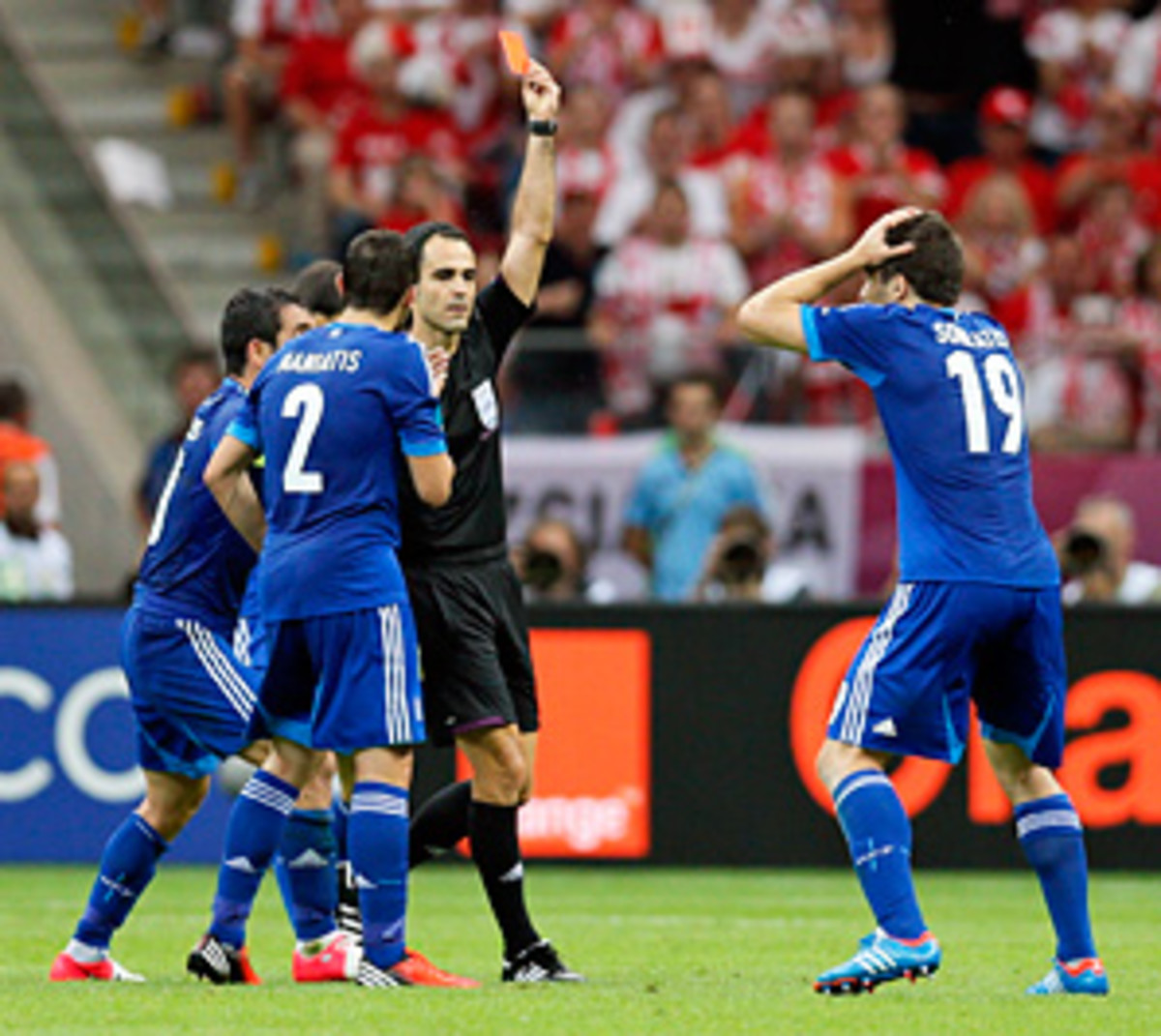
Three thoughts from Poland-Greece
1. Sokratis Papastathopoulos was exceptionally unlucky to be sent off... Achieving balance is never easy for referees: Be too weak and you risk players suffering injury; be too tough and you risk showing cards to players who have done nothing to earn them. The feeling for a while has been that Spanish football has erred on the side of strictness. Large numbers of Spanish league games are ruined by red cards when there was neither malice nor recklessness to deserve them. Spanish referee Carlos Velasco showed 16 red cards in the 19 league matches he refereed last season, so it was somewhat predictable that he sent two players off in the Euro 2012 opener: the second justifiably, but the first, very, very wrongly.
The unfortunate player was Sokratis Papastathopoulos. He picked up his first yellow card in the 35th minute for an aerial challenge in which his arm brushed the face of Robert Lewandowski as the two leapt for a header, the sort of unintentional contact that happens dozens of times per game. His second came 10 minutes later, as Rafal Murawski slipped as he turned, momentum carrying the former into the Greek. Short of dematerializing, it's not clear what Papastathopoulos could have done to avoid contact -- if anything, the foul should have been called the other way. But Velasco is a referee who believes that every collision must have a cause. He awarded the free kick, and showed a second yellow which resulted in a red for Papastathopoulos.
2. ...but it did Greece a favor. There are two Greece teams: the one that won Euro 2004 with organization and spirit, and every other team that's either failed to qualify for major tournaments or qualified and was dreadful. This squad is somehow both. Fernando Santos was supposed to make Greece a more attacking side, but based on the evidence of the first half, he merely made them a worse defending one. Georgios Samaras offered next to nothing in the way of defensive protection, allowing Piszczek to break forward at will and leaving Jose Holebas exposed.
In the second half, however, perhaps inspired by a sense of injustice, Greece rediscovered the doughtiness of 2004. It had more determination, more bite and a better shape, even as the fullbacks continued to get forward. Who knows what was said in the dressing room at half time, but the second half produced a better display on all levels. Dimitris Salpingidis, who replaced Sotiris Ninis, had an excellent game, scoring the equalizer and generally making the midfield tighter. Had Georgios Karagounis not missed the penalty that led to the dismissal of Wojciech Szczesny, Greece might even come away with the victory. If Greece plays like it did in the first half, it won't take another point. If it plays like it did in the second, it could potentially reach the quarterfinal.
3. This is a good ball. One of the reasons that the 2010 World Cup disappointed was its use of a Jabulani ball. The ball may have been thermally bonded with eight three-dimensional panels spherically molded from ethylene-vinyl acetate (EVA) and thermoplastic polyurethanes, but it just didn't work for football. It swerved and dipped unpredictably, drawing criticism not merely from goalkeepers --- "it is very sad that a competition so important as the World Championship will be played with such a horrible ball" said Spain's Iker Casillas -- but also from creative players such as Lionel Messi who insisted it was almost impossible to control. Crossing and set plays in the tournament suffered as a result.
The warning signs first emerged at the Cup of Nations in Angola, five months before the World Cup. That tournament, too, was played with a Jabulani ball, and it featured a series of goalkeeping errors. Two years later, the ball at the Cup of Nations in Equatorial Guinea and Gabon was a Comoequa, the same model as the Tango 12 in use at the Euros. Perhaps predictably, there were no complaints about the standard of crossing, and goalkeeping was excellent.
Within 20 minutes it was obvious that this is a ball that players can cross with confidence. Both Jakub Blaszczykowski and Lukasz Piszczek delivered dangerous balls from the right. One Blaszczykowski cross set up the opener for Robert Lewandowski, and it was a superb delivery from Vassilis Torossidis that led to the equalizer. A brilliantly passed ball from Kostas Fortiunis led to the Greek penalty. Forget all the marketing nonsense -- all anybody wants is a ball that behaves the way people who've spent years kicking, heading, punching and catching them can anticipate. This one certainly seemed to fit that billing.
On a conditions-related note, why was the roof closed? I know that it rained in Warsaw, Poland, on Thursday, but are footballers suddenly unable to cope with a little rain? One of the beauties of football is that players cope with different playing styles in a variety of different conditions. UEFA and FIFA seem intent on homogenizing playing conditions, but they might be better served to get the basics correct, such as having signs that point in the right direction, stewards who have some idea of where things are and desks for journalists rather than expecting them to work with laptops balanced on their knees in the midst of fans. In terms of the organization of press facilities, Equatorial Guinea was much better during the Cup of Nations.




